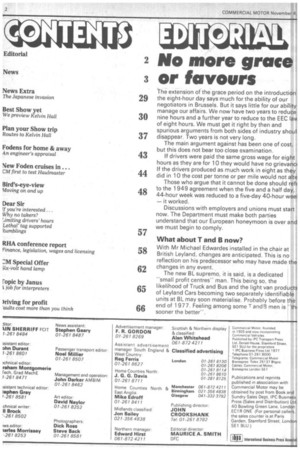No more grace or favours
Page 4

If you've noticed an error in this article please click here to report it so we can fix it.
The extension of the grace period on the introduction the eight-hour day says much for the ability of our negotiators in Brussels. But it says little for our ability manage our affairs. We now have two years to reduce nine hours and a further year to reduce to the EEC lavk of eight hours. We must get it right by then and spurious arguments from both sides of industry shoul disappear. Two years is not very long.
The main argument against has been one of cost, but this does not bear too close examination.
If drivers were paid the same gross wage for eight hours as they are for 10 they would have no grievancl If the drivers produced as much work in eight as they did in 10 the cost per tonne or per mile would not alte Those who argue that it cannot be done should ref( to the 1949 agreement when the five and a half day, 44-hour week was reduced to a five-day 40-hour weel — it worked.
Discussions with employers and unions must start now. The Department must make both parties understand that our European honeymoon is over and we must begin to comply.
What about T and B now?
With Mr Michael Edwardes installed in the chair at British Leyland, changes are anticipated. This is no reflection on his predecessor who may have made the changes in any event.
The new BL supremo, it is said, is a dedicated "small profit centres" man. This being so, the likelihood of Truck and Bus and the light van products of Leyland Cars becoming two separately identifiable units at BL may soon materialise. Probably before the end of 1977. Feeling among some T and B men is "th, sooner the better".
















































































































